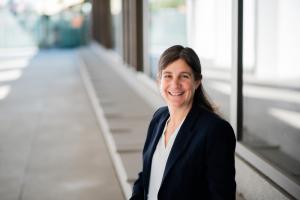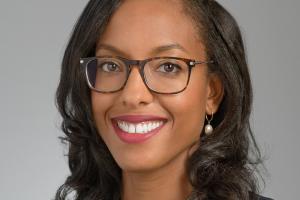
Description
Rachel S. Gross, M.D., M.S., a pediatrician and clinical research investigator, has spent much of her career studying early child obesity, especially in communities disproportionately affected.
She’s also spent a lot of time thinking about what to do about it. Early on, she said, “I was saddened and frustrated to find a lack of access to healthy food among young children living in homes experiencing financial hardship, and a lack of programs and resources to fight this problem.”
Now Gross, an assistant professor of pediatrics and population health at the New York University Grossman School of Medicine and Bellevue Hospital Center, is lending her skills in research and prevention to a new kind of real-life challenge: COVID-19.
Gross is a leader in RECOVER (Researching COVID to Enhance Recovery), the nationwide, NIH-led initiative dedicated to better understanding the long-term effects of COVID. She serves as a principal investigator for the pediatric cohort within the ongoing observational study and is Director of Pediatric Research for the RECOVER Clinical Science Core at NYU Langone Health, leading the complex effort to determine the prevalence, natural history, and health effects of Long COVID in children.
“Children are the hidden victims of the pandemic,” Gross said. “Families have described over 200 different symptoms that have been lasting far longer than when the period of infection occurred. Yet we still don’t have a good definition of what Long COVID is in children. We have a lot to learn.”
Gross’ career has neatly combined her two lifelong passions – studying science and working with children and their families. She majored in biology in college, and after attending medical school in New York City, her hometown, specialized in pediatrics.
She knew she wanted to tend to the health of children individually, but she soon realized she also wanted to conduct research on the health of children as a population. It was no surprise, then, that the growing childhood obesity epidemic caught her attention.
“When I was in training, I encountered many infants and toddlers who were gaining weight too quickly,” Gross said. As soon as she could, she set about to make change. She was one of the original developers of the Starting Early Program (StEP), a primary care-based program in New York City that promotes healthy child growth from pregnancy through age three. The successful program is designed for families with lower incomes and includes nutrition counseling and parenting support groups.
Gross, who is also passionate about mentoring the next generation of women scientists, hopes to continue setting an example by amplifying the work and voices of the many women working alongside her.
“Some of the most impactful contributions to science and society have been made by women,” Gross said. “So as a physician scientist, it’s important for me to promote female representation in STEM today—so that we have a more equitable field tomorrow.”



